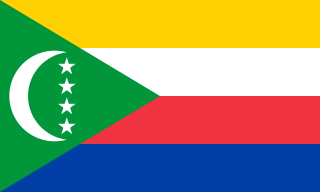
Politics of the Union of the Comoros takes place in a framework of a federal presidential republic, whereby the President of the Comoros is both head of state and head of government, and of a multi-party system. Executive power is exercised by the government. Federal legislative power is vested in both the government and parliament.

Anjouan is an autonomous high island in the Indian Ocean that forms part of the Union of the Comoros. Its chief town is Mutsamudu and, as of 2006, its population is around 277,500. The total area of the island is 424 square kilometers.
Colonel Mohamed Bacar was President of Anjouan, one of the three autonomous islands that make up the Union of the Comoros, from 2001 to 2008. He is a former chief of police on Anjouan and has studied extensively in France and the United States. He was part of a military coup on Anjouan in August 2001 and soon became President. It is alleged he rigged the elections to become the first president of Anjouan in March 2002, in part due to his leading role in the separatist movement. He was ousted by the combined forces of the Government of the Union of Comoros and the African Union in the March 2008 invasion of Anjouan.

Elections in the Comoros take place within the framework of a multi-party democracy and a presidential system. The President and the majority of the seats in the Assembly of the Union are directly elected.

Presidential elections were held in the Comoros on 16 April and 14 May 2006. As it was the turn of the island of Anjouan to hold the union presidency, a primary election was held in Anjouan on 16 April, prior to a national election on 14 May. The result was a victory for Ahmed Abdallah Mohamed Sambi, who received 58% of the vote in the national election.

The invasion of Anjouan, on 25 March 2008, was an amphibious assault led by the Comoros, backed by African Union (AU) forces, including troops from Sudan, Tanzania, Senegal, along with logistical support from Libya and France. The objective of the invasion was to topple Colonel Mohamed Bacar's leadership in Anjouan, an island in the Union of Comoros, when he refused to step down after a disputed 2007 election, in defiance of the federal government and the AU. The Comoros archipelago in the Indian Ocean has had a fractious history since independence from France in 1975, experiencing more than 20 coups or attempted coups.

A presidential election was held in Anjouan on 15 June and 29 June 2008 following the 2008 invasion of Anjouan to oust Mohamed Bacar as President of Anjouan. The election was won by Moussa Toybou, who defeated Mohamed Djaanfari in the second round.

Parliamentary elections were held in the Comoros on 6 December 2009, with a second round on 20 December. The elections were originally scheduled for July 2009, but were postponed until after a constitutional referendum was held in May 2009. They were then scheduled to take place on 29 November, but were delayed again. The result was a victory for the Baobab Movement, a coalition supporting President Ahmed Abdallah Mohamed Sambi.

Presidential elections were held in the Comoros on 7 November 2010, with a second round on 26 December, alongside gubernatorial elections for the three main islands. The result was a victory for Ikililou Dhoinine, who received 61% of the vote.

Presidential elections were held in the Comoros on 6 March 1996, with a second round on 16 March. They were won by Mohamed Taki Abdoulkarim, who had come second in the 1990 elections, and who had briefly served as acting President in October 1995 in the aftermath of another coup attempt led by Bob Denard.

Presidential elections were held in the Comoros in 2002. In accordance with the new constitution approved in a referendum the previous year, the island of Grande Comore was to provide the candidates for this election as part of a rotation agreement between the three islands. A first round was held on Grande Comore on 17 March, after which the top three candidates, Azali Assoumani, Mahamoud Mradabi and Saïd Ali Kemal went through to a second, national round of voting on 14 April. However, both Mradabi and Kemal boycotted the second round, leaving first round winning Assoumani as the only candidate.

Parliamentary elections were held in the Comoros on 22 November 1992, with a second round on 29 November 1992. Due to electoral irregularities in the initial elections, there were also by-elections in six of the 42 constituencies on 13 and 20 December.

Early parliamentary elections were held in the Comoros on 12 December 1993, with a second round in all but four seats on 20 December. The elections were held after President Said Mohamed Djohar dissolved the Federal Assembly elected in November 1992.

Ikililou Dhoinine is a Comorian politician who was the President of the Comoros from 2011 to 2016; he was a Vice-President of Comoros from 2006 to 2011.

Presidential elections were held in the Comoros on 21 February 2016, with a second round to be held on 10 April 2016, alongside elections for the Governors of the three islands. Azali Assoumani of the Convention for the Renewal of the Comoros was elected President with 41% of the vote.

The Movement for Democracy and Progress, also known as the People's Democratic Movement was a political party in the Comoros.

The Union of Democrats for Development was a political party in the Comoros led by Ibrahim Halidi. Based on Anjouan, it was supportive of the government of President Said Mohamed Djohar.

Early presidential elections will be held in the Comoros on 24 March 2019 alongside regional elections. If required, a second round will be held on 21 April.






